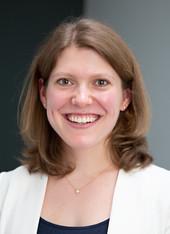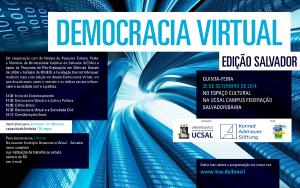#DemocraciaVirtual - Foundation Office Brazil
Event Reports
Social media, citizen participation and governmental openness at the local level were the dominant keywords of the sixth edition of the Virtual Democracy series. After the introductory words by the representatives of the responsible entities – KAS, UCSAL and UFBA – Mr. Fabro Steibel, Lecturer of Communication Sciences at the ESPM – University of Rio de Janeiro and Political Advisor to the Brazilian government on matters of the Open Virtual State, opened the first panel.
Mr. Steibel postulated that a strong democracy would always need active citizens, capable of bringing life to it. That traditionally, this took place through assemblies and the physical presence of the decision makers. Over time, this circle of decision makers would open, notwithstanding the initial exclusion of women in the decision-making processes, as a matter of principle. That now however, at the beginning of the 21st century, the traditional assembly venue had diversified. As a result of the digital revolution one need not be physically present at a given venue to reach a decision. That the input of ideas would take place in real time from any digital terminal device - and it was quickly ascertained that all participants, without exception, owned at least one Internet-enabled mobile phone. In order to render participation, from which the democratic system thrives, more interesting and lively, Mr. Steibel suggested that particularly young people could be encouraged to take part in decisions at the local level, by way of gamification applications. In this manner, the traffic jams common to all the country’s major cities, were lessened in the city of Porto Alegre through the suggestions of its inhabitants, who playfully reported a problem zone by way of an application and just as in a multiple-choice game could opt themselves for pre-established solutions. Ultimately, statistics drawn up in this manner helped reduce the risk of jams at congestion-prone points. At this point the principle of solidarity comes into play: most usually the drivers themselves know which way forward is best for avoiding hurdles. Here collective knowledge and cooperation for the benefit of the community – combined with a user-friendly application – made all the difference. Firstly, pursuant to Mr. Steibel, the more fun within an application, the more people would take part. Secondly, user-friendly handling would lead the way to success. This would also be the reason of the runaway success of the Instant-Messenger WhatsApp vis-à-vis Facebook-Messenger: WhatsApp is simply more intuitive, faster and thus more joyful. Moreover, this multistakeholder-process led Mr. Steibel to the postulation of the thesis that such open governance would be “sexy”. In conclusion he singled out three major challenges for governments in the Virtual Age: They would have to commit themselves – in order to achieve good governance – firstly to transparency, secondly to digital inclusion and, thirdly, to accountability vis-à-vis every citizen.
Ms. Camilla Braga held the second discussion-trigger lecture: She is responsible for communications of the City Council of Curitiba within the social media and straightaway asked who among her audience made use of the social mediums Facebook, Twitter and Instagram. However, the reply of 90% of those present reversed itself, when she asked, who kept him/herself informed about a local council or government in these mediums. Usually, it would be more difficult for the legislative and executive branches with their seemingly bureaucratic and cumbersome topics to penetrate the sphere of interests of social-media users, wherein they would have to compete with the user’s preferred musical artists or favourite football team. This is all the more surprising, precisely because real-time communication with local governmental authorities would be advantageous to everyone – on occasion of power outage or any risk situation it would be possible to ensure swift communication with the community. Particularly in Brazil, whose population makes intensive use of the Internet via mobile terminal devices, there exists significant potential. Ms. Braga concluded with the thesis that traditional mass media – would never be able to compete with the diversity, quantity and relevance of the media of the people – which she equated with social media.
The subsequent debate under the coordination of Messrs. Claudio André (UCSAL) and Christian Matthäus (KAS) addressed, in particular, the issue of how civil-society participation or digital citizen-manifestations might complement the traditional forms of participation in Brazil’s representative federal democracy.
In the second part of the seminar Ms. Camila Braga invited participants to a case study regarding her work as a communication expert of the city of Curitiba. She conducted a presentation of her daily work based on numerous fascinating case examples of how the flow of communication between the city’s administrative level and the city’s inhabitants takes place. In particular, she highlighted an example of interactive engagement trough inhabitants: The municipality of Rio de Janeiro after posting, initially rather jokingly, a marriage proposal to the municipality of Curitiba, on the latter’s Facebook site, a steadily increasing number of both cities’ inhabitants became interested in such a virtual marriage. As a matter of fact, the communication experts of both metropolises did indeed arrange this virtual marriage – nonetheless, not only the administrative branches but also the inhabitants of both cities had to comply with specific conditions. Instead of actual wedding gifts, both cities pledged themselves, among other activities, to plant a good number of trees pursuant to the motto “urban reforestation through urban administration”; to social-welfare programs, as well as to a major blood-donation campaign currently in its initial stage. Thus, digital communication would also provide pleasure – thereby confirming Mr. Fabro Steibel’s thesis. Furthermore, it shows that initiatives may emanate not only from local-level administrative branches but also from inhabitants. In other words: an active democracy under direct citizen participation. What further developments may arise out of the marriage of the hereinabove mentioned municipalities remains to be seen and depends on the participation of their inhabitants via the social mediums. Nonetheless, it has become clear that virtual initiatives can actually lead governmental measures. Ms. Braga postulated that what could be implemented locally had the same chances for success both at the national and international levels. This might pave the way for a democratization of the international system.
Already for the second time the “Virtual Democracy” seminar took place in Brazil’s northeast. By way of the hashtags
and
those interested in Digital Governance and Citizen Participation could follow the debates and contribute to them with their own ideas and suggestions.












